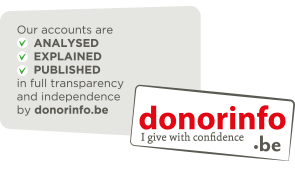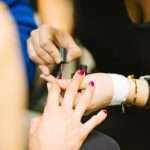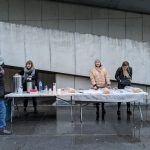“When you are walking down the street and you see a homeless person you wouldn’t normally stop to talk to them, but once you have this powerful sandwich in your hand, you can start a conversation, and it is up to you to continue it. The sandwich is the tool you need to start a conversation.”
That is how Andrea came across a Roma family at the entrance of a big clothes store. More than a year ago she was walking in Brussels giving out sandwiches when she found a kid without shoes during a cold winter. Andrea wanted to help him and his family but they could hardly communicate because of the lack of a common language.
The solution they found was to draw the size of the kid’s feet on a piece of paper to get shoes for him. After that, Andrea got a second-hand pair of shoes from a classmate of one of her daughters. “When we went to give it to them they were extremely happy.” Andrea figured out that they had more needs, so she made “a shopping list” of everything they needed.
“You don’t know how much you can do for someone until you try it yourself. I never thought I could have helped them and then see such a good result.”
By that time, she had shared the story of this family with the parents of the iDSB, the international German school. One mother in particular, a Romanian doctor, asked Andrea if she could join her the next time to help translate. She wanted to see the family and to understand how they ended up there. But the following week when they went to the entrance of the clothes store, they couldn’t find them. “They just weren’t anywhere to be found in Brussels,” she says.
Although they didn’t find this family, they came across another one: a Roma family with five children, which Andrea already knew from before. “I know they are Roma, and that they are Rumanian. I am sure they know the family we are looking for,” she told her friend. Unfortunately, they didn’t know about their whereabouts, “but we can still help this family with something” they thought to themselves.
Once again they made a “shopping list,” but now with the needs of the family of seven. In particular, their children needed help with getting all the things from a list of items for a school trip. Once Andrea collected all the items she went back to meet them.“They were so happy,” she says with a big smile on her face. “They did not expect that anybody would keep their promise and come back. Usually, nobody cares.”
Seeing how she had helped the family, Andrea wanted to do something else for them. She noticed that their three-year-old girl was walking around with winter clothes in the middle of the summer. She saw an opportunity to help them, so she took note of what they needed and collected the donations from her colleagues at work.
“They were certainly a case of a family that with some help and guidance you can get in the right direction.”
Once again, after getting everything on the list, she went with her friend to meet with them. “I wanted to learn more about them, but I noticed they were not telling everything. There were bits and pieces they wouldn’t share with you.” They told them that they had lived under a bridge and that they were currently living in a shelter, but that they would prefer a better one. “But still, it wasn’t completely clear.”
A few weeks later the family contacted them and told Andrea that they had gotten a notification from the Samusocial shelter, the official organisation in Brussels that looks after the homeless. They had told them that they were being transferred to a night shelter as they had been in the family shelter for too long already and there were other families waiting. “The family was really stressed,” she says with a concerned look in her eyes.
Through an event organised at her work, Andrea introduced the family to Les Amis d’Accompagner, another NGO whose aim is accompanying people in need to places where they need help with paperwork. For instance, helping them at the commune by translating what they need to bring or what they need to do.
The family got an appointment with the NGO, but on the day they had agreed on the meeting, the family didn’t appear. Speaking to them again through her Romanian friend, they figured out they hadn’t even realised they had an appointment, even though they had a translator. “They can’t read nor write and they haven’t gone to school, so trying to explain something to them was very difficult,” Andrea explains.
It was late autumn and around that same time, the situation at the night shelter got really complicated for them. It was about to be winter so it was getting colder and colder and getting access to the night shelter was more difficult every day as more and more people in need were calling in for a spot.
It wasn’t even guaranteed that they would get shelter every day and to make things worse this place did not provide food for them. “That is when one of STC projects came very handy: Le Phare in Sainte-Catherine.” On Tuesdays, they could get a free warm meal, so Andrea accompanied them personally to ensure that they knew where it was.
“After three weeks the family couldn’t stay at that shelter either. Usually, it is for one or two nights, but not for a continuous stay. I didn’t know what to do,” Andrea says. A week later she saw them at Le Phare again, in a difficult state as the situation with the children and the shelter did not work out any more. They could not guarantee a safe and warm place to stay, and didn’t even have any food to give the children during their long days at school. “They panicked, and some days after they found someone with a car that took them back to Romania. They just left Brussels overnight.”
Andrea and her friends thought that this was the end of the story despite having done everything they could to help them. But two weeks later, they received a phone call from them. They couldn’t find a job and they were lacking everything in the cold and cruel Romanian winter. Once more, Andrea and her acquaintances helped collect clothes and shipped them to Romania to keep them warm during the winter.
Meanwhile, a job offer they had received in Romania did not materialise for them as they were too far away from the place and could not afford to relocate their family closer. “They couldn’t accept the job, it was a really tragic situation.” Once again Andrea and her friends thought that was it. She didn’t hear from them until February 2019 when Andrea came across the family during the Big Volunteer Day.
They had returned to Belgium because things were really complicated in Romania. Although they almost had nothing in Belgium, they still had more here thanks to the social system. The father had gotten a job offer in Belgium and an offer for an apartment if they could find a way to pay for it. But in order to do that they needed their papers in order.
Without thinking it twice, Andrea asked again for an urgent meeting with Les Amis d’Accompagner so they could have specialised help with getting their papers in order. One of the first things the NGO tackled was finding a school for the children and convincing the mother to take French classes to learn how to read and write, therefore being more integrated. With the assistance of Les Amis d’Accompagner, who are currently still closely accompanying the Roma family, they were able to get the documents needed to work legally, get an insurance, and pay rent.
“It looks like they are actually starting to get a chance in life. From living under a bridge to getting their own place.”
Andrea connected the family with one last NGO which helps families with the school materials the children need, and she signed them up for a food bank. They have been in Brussels on and off for 8 years but they knew nothing about the services provided by the city.
“I don’t know how they managed to survive.” Now they are in a completely different situation in comparison to one year ago when this seemed impossible. “But still, nothing is really safe. They are still living in a very dangerous situation,” she reflects.
Andrea, a European citizen living in Belgium, wanted to address something specifically for the expat population in Brussels. “Even if you think you can’t help because it is a foreign country and you don’t know what is going on, you can, in fact, do something. By making connections and talking to a lot of people and NGO’s, you can connect the dots, the family or person in need with the organisation that can help them.”







